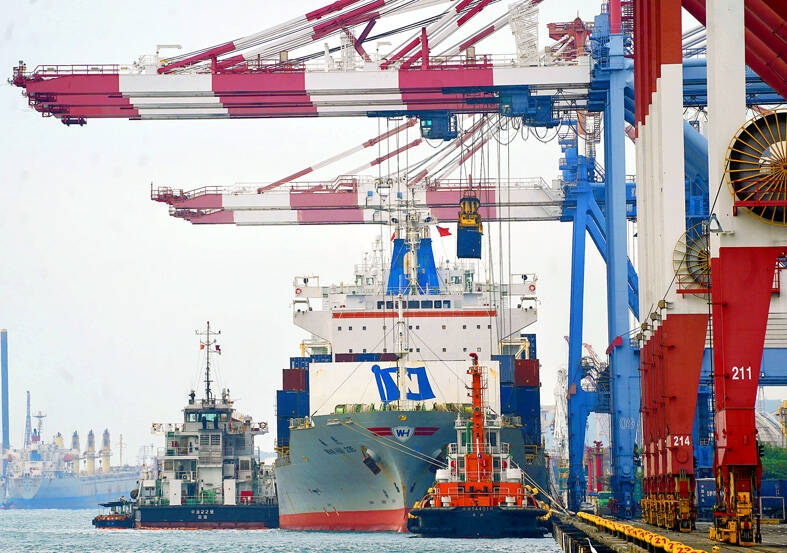Exports last month slumped 13.1 percent year-on-year to a 19-month low of US$36.13 billion, as demand for all product categories dwindled in almost all markets, especially in China, the Ministry of Finance said yesterday.
The decline was the fastest in seven years, with China contributing 66 percent, as escalating COVID-19 infections weighed on sales of smartphones and other consumer electronics, the ministry said.
“The retreat this quarter turned out worse than expected and might far miss the recent forecast by the Directorate-General of Budget, Accounting and Statistics,” Department of Statistics Director-General Beatrice Tsai (蔡美娜) said.

Photo: CNA
The agency is looking at a 3.9 percent fall in exports this quarter, but the actual decline would double to 7 percent, Tsai said, adding that tepid sales spread to high-tech sectors without signs of improvement any time soon.
Persistent inflation and drastic monetary tightening, as well as China’s strict COVD-19 restrictions, dashed hopes of a business rebound boosted by Double 11 Singles’ Day in China and Christmas sales in the West, she said.
That explained why Apple Inc had slashed its iPhone sales forecast for this year, Tsai added.
Exports this month might tumble 8 to 12 percent, she said.
Shipments of electronic components shrank 4.9 percent, with chip sales falling 3.4 percent, ending nearly three years of expansions, the ministry’s monthly report showed.
Exports of optical devices, mainly flat panels and camera lenses, remained the weakest, with a 31.9 percent decrease from a year earlier, Tsai said, adding that smartphone camera lens supplier Largan Precision Co (大立光) expects lackluster business for this month.
Exports to China, including Hong Kong, plunged 20.9 percent, erasing gains in the first 10 months of this year, and might further decline this month, Tsai said.
Shipments to other destinations were similarly soft, with an 11.3 percent decrease to the US, a 19 percent drop to Europe and a 4.5 percent retreat to Southeast Asia, she said.
Japan proved the exception with a 15 percent gain, thanks to robust demand for electronics, the report said.
A weak New Taiwan dollar against the US dollar also weighed on exports, Tsai said.
Imports fell 8.6 percent to US$32.7 billion, giving Taiwan a trade surplus of US$3.43 billion, down 40.6 percent from a year earlier, the ministry said.
Imports of agricultural and industrial raw materials shed 15.3 percent, as local firms cut capacity to cope with a business slowdown and facilitate inventory adjustments, it said.
Imports of capital equipment held strong with an 11.7 percent pickup, as semiconductor firms pressed ahead with technology upgrades, it said.
In the first 11 months, exports expanded 9.4 percent to US$443.78 billion, while imports advanced 14.3 percent to US$396.63 billion, it said.
Exports are expected to set a record for the full year, but the outlook for the next couple of months is bleak, Tsai said.

NEW IDENTITY: Known for its software, India has expanded into hardware, with its semiconductor industry growing from US$38bn in 2023 to US$45bn to US$50bn India on Saturday inaugurated its first semiconductor assembly and test facility, a milestone in the government’s push to reduce dependence on foreign chipmakers and stake a claim in a sector dominated by China. Indian Prime Minister Narendra Modi opened US firm Micron Technology Inc’s semiconductor assembly, test and packaging unit in his home state of Gujarat, hailing the “dawn of a new era” for India’s technology ambitions. “When young Indians look back in the future, they will see this decade as the turning point in our tech future,” Modi told the event, which was broadcast on his YouTube channel. The plant would convert

‘SEISMIC SHIFT’: The researcher forecast there would be about 1.1 billion mobile shipments this year, down from 1.26 billion the prior year and erasing years of gains The global smartphone market is expected to contract 12.9 percent this year due to the unprecedented memorychip shortage, marking “a crisis like no other,” researcher International Data Corp (IDC) said. The new forecast, a dramatic revision down from earlier estimates, gives the latest accounting of the ongoing memory crunch that is affecting every corner of the electronics industry. The demand for advanced memory to power artificial intelligence (AI) tasks has drained global supply until well into next year and jeopardizes the business model of many smartphone makers. IDC forecast about 1.1 billion mobile shipments this year, down from 1.26 billion the prior

People stand in a Pokemon store in Tokyo on Thursday. One of the world highest-grossing franchises is celebrated its 30th anniversary yesterday.

Zimbabwe’s ban on raw lithium exports is forcing Chinese miners to rethink their strategy, speeding up plans to process the metal locally instead of shipping it to China’s vast rechargeable battery industry. The country is Africa’s largest lithium producer and has one of the world’s largest reserves, according to the US Geological Survey (USGS). Zimbabwe already banned the export of lithium ore in 2022 and last year announced it would halt exports of lithium concentrates from January next year. However, on Wednesday it imposed the ban with immediate effect, leaving unclear what the lithium mining sector would do in the